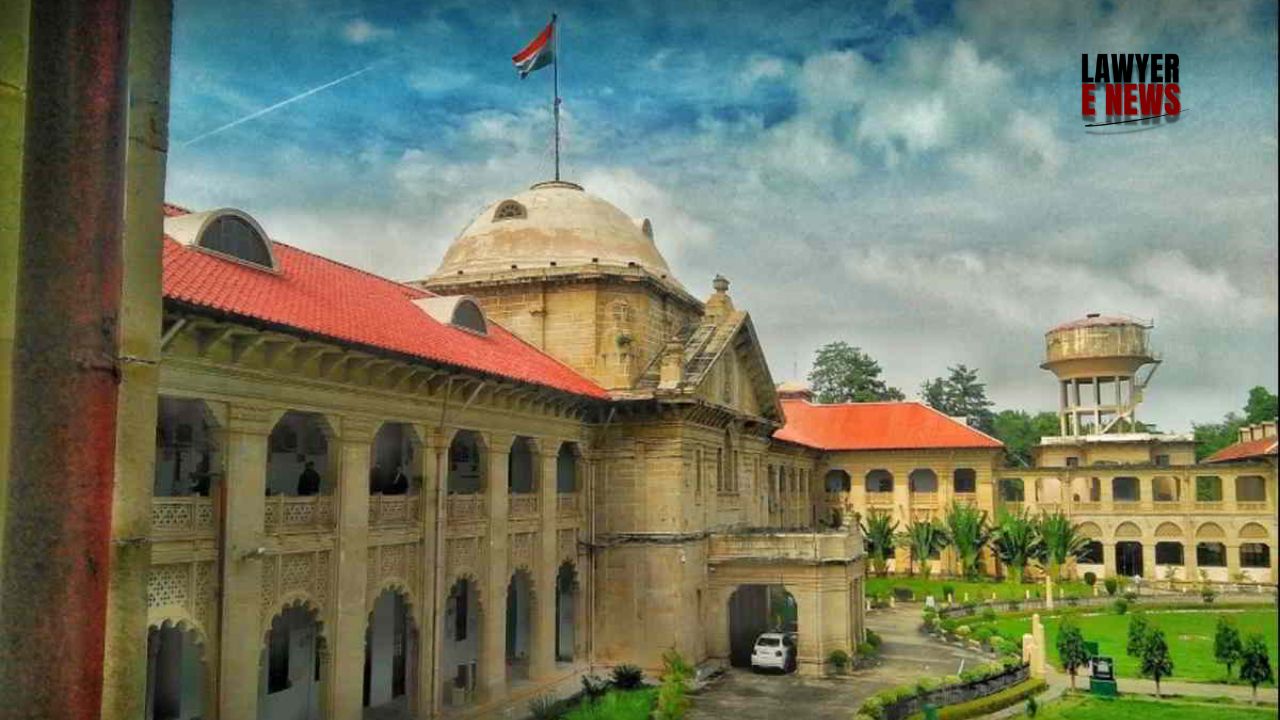-
by Admin
15 February 2026 5:35 AM



Opening of History Sheets Without Following Natural Justice Condemns Citizens Unheard - Allahabad High Court quashed Class-B history sheets opened against the petitioners under Regulation 228 of the U.P. Police Regulations, finding that such actions violated the principles of natural justice and the constitutional guarantees enshrined in Articles 14, 19, and 21 of the Constitution of India.
The petitioners, comprising members of the Malik family, were subjected to police surveillance after being implicated in cases under Section 386 of the IPC and Section 2/3(1) of the U.P. Gangsters and Anti-Social Activities (Prevention) Act, 1986. The court found that the police action lacked procedural fairness and directed the State Government to reform the regulatory framework to ensure compliance with constitutional mandates.
The Allahabad High Court sharply criticized the colonial-era provisions of the U.P. Police Regulations, noting their incompatibility with the modern constitutional framework. It observed that history sheets under Class-B, which subject individuals to perpetual police surveillance, were opened without granting them an opportunity to present objections. The bench held:
"Even in the absence of statutory provisions, the principles of natural justice must be read into any action that affects personal liberty and rights. The opening of history sheets without affording an opportunity to object constitutes a blatant violation of Article 14 of the Constitution."
The petitioners—Firoj Malik, Sajid Malik, Imran Malik, and their father Nizam Malik—alleged that they were falsely implicated in criminal cases due to political and business rivalry. The cases included:
Case Crime No. 336 of 2019: Registered under Section 2 of the U.P. Gangsters and Anti-Social Activities (Prevention) Act, targeting Nizam Malik.
Case Crime No. 408 of 2020: Registered under Section 386 IPC based on a complaint by private individuals.
Case Crime No. 710 of 2020: Registered under Sections 2/3(1) of the U.P. Gangsters Act, implicating all petitioners.
The petitioners contended that these cases lacked merit and were lodged to justify the subsequent opening of Class-B history sheets. The police relied on unverified allegations and did not provide any opportunity for the petitioners to object before approving the history sheets.
"Colonial-Era Regulations Cannot Override Constitutional Guarantees"
The court analyzed Regulation 228 of the U.P. Police Regulations, which authorizes the opening of Class-B history sheets for individuals deemed to be habitual or professional criminals.
It observed: "The U.P. Police Regulations reflect a bygone colonial mindset that treats certain individuals or communities as 'criminal tribes' incapable of reform. Such regulations have no place in a democratic society governed by the Constitution of India."
The court also noted that Regulation 232 permits Class-B history sheets to remain "continuously open" until the death of the individual, with no provision for periodic review. This, the court held, was an arbitrary and disproportionate intrusion into personal liberty.
Principles of Natural Justice Must Be Followed"
The court emphasized that procedural fairness is essential in all actions that affect fundamental rights. It held: "Even if the regulations do not explicitly mandate a hearing, the principles of natural justice must be read into them. The absence of an opportunity to object before opening a history sheet renders the process unconstitutional and violative of Article 14."
Referring to the Supreme Court’s judgment in Mangi Lal v. State of M.P. (2004) 2 SCC 447, the court stated:
"Where substantial rights of individuals are affected, the application of natural justice becomes presumptive, unless excluded by express statutory provisions."
"Surveillance Violates Articles 19 and 21"
The court held that police surveillance based on Class-B history sheets infringes upon the fundamental rights to privacy, free movement, and dignity guaranteed under Articles 19 and 21 of the Constitution.
Justice Siddharth observed: "Surveillance under Class-B history sheets turns the entire country into a prison for the individual, depriving them of the freedom to move, associate, and live without fear of constant monitoring."
Munna Lal Gupta v. State of U.P. (2016 SCC OnLine All 3023), the court reiterated that surveillance imposes psychological and social constraints on individuals, effectively rendering them prisoners in their own homes.
The court quashed the impugned history sheets opened against the petitioners and directed an immediate cessation of police surveillance.
Justice Subhash Chandra Sharma noted: "The opening of Class-B history sheets against the petitioners was done without application of mind, relying solely on the Station House Officer's report. This approach is arbitrary and unconstitutional."
Directions to the State: Reforming the Regulatory Framework
Recognizing the need for systemic reforms, the court issued the following directives to the State Government:
Mandatory Opportunity to Object: Before opening history sheets under Class-A or Class-B, the police must provide the individual an opportunity to submit objections.
Annual Review of History Sheets: The government must introduce a mechanism for annual review of history sheets to ensure that individuals exonerated or acquitted of charges are no longer subjected to surveillance.
Amendment of U.P. Police Regulations: The State must revise the pre-independence regulations to align with constitutional mandates and protect individual liberties.
The Principal Secretary (Home), Uttar Pradesh, was directed to submit a compliance report within three months. The court remarked:
"The regulatory framework for opening and maintaining history sheets must reflect the values of a democratic society and ensure that citizens are not condemned to perpetual surveillance without justification."
The Allahabad High Court’s judgment is a strong reaffirmation of constitutional principles, emphasizing the need for procedural fairness and the protection of fundamental rights. The court’s directives to reform the U.P. Police Regulations mark a significant step toward ensuring that colonial-era practices do not undermine the liberties of citizens in a democratic India.
Date of Decision: January 21, 2025
